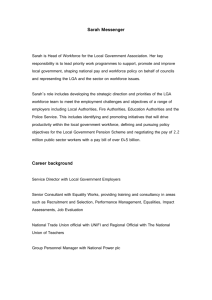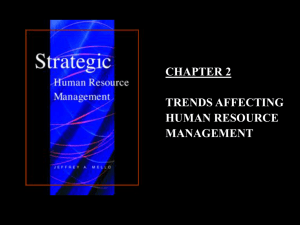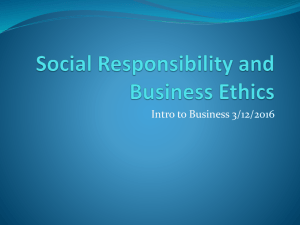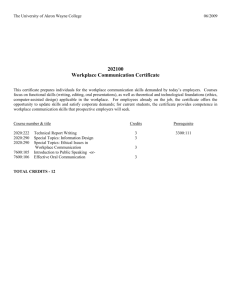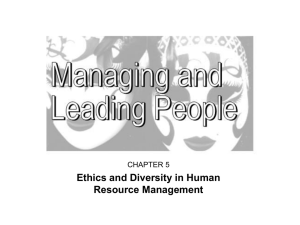Title Page - Smoky Hill Education Service Center
advertisement
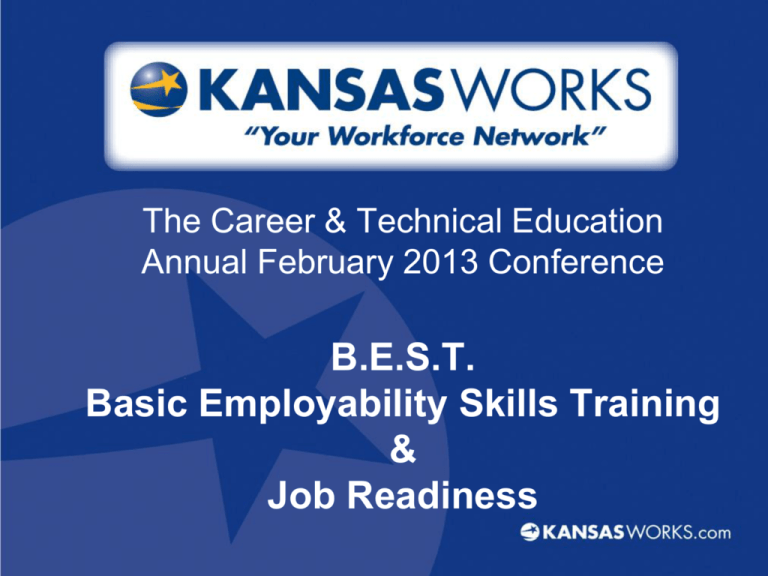
The Career & Technical Education Annual February 2013 Conference B.E.S.T. Basic Employability Skills Training & Job Readiness Be the BEST you can be! •BEST Basic Employability Skills Training • Job Readiness Workforce Center Services BEST beginnings • • • • JC Workforce Summit, January 2005 Quality Workforce Committee Missouri program (NEMO BEST) Local development Why BEST? Need for a quality workforce Industry skills can be taught Soft skills cause many employees to lose their jobs Employers requested training in the soft skills 7 BEST Workshops Be There! – Looking Good Power of a Positive Attitude Keeping Your Job Working with the Public/Customer Service 5. Communicating Effectively 6. Resolving Conflict 7. Ethics in the Workplace 1. 2. 3. 4. BEST Outline • Stand alone Modules taught in 75-90 minute segments • Employers, participants can select areas of need/interest • Training can be provided on-site for schools, business and industry Module 1: Be There! – Looking Good Deals with absenteeism and punctuality • Asks participants to plan ahead! Participants consider various appearance and grooming scenarios for interview and workplace Looking Good • Definitely OK for WORKPLACE • Definitely NOT OK for WORKPLACE • IT DEPENDS • chewing gum • Budweiser© shirt • cologne or after shave • tennis/running shoes • Sandals-flip flops • tattoos Power of a Positive Attitude • Identify positive personal attributes • Consider positive v. negative approaches to various situations Power of a Positive Attitude • It’s not my job! Keeping Your Job • Focuses on behaviors and attribute of quality employees -- workplace “etiquette” Working with the Public/Customer Service • Who are your customers? • Learn strategies for dealing with difficult customers • Paying attention to your customers! Customer Service Quiz 1. The average company/organization doesn’t hear from _____% of unhappy customers. 2. An unhappy customer will complain about a problem or poor service to ___ others; 13% will tell more than ___ people. 3. The average customer will only tell ____ others about the resolution of a problem. Thinking positively: • new here. • I don’t think I can do that. • I’m supposed to get off work in 5 minutes. Effective Communication • Learn/practice active listening • Generations in the workplace Communicating Effectively Listening Skills Checklist • Makes eye contact • Facial expression is appropriate and shows interest • Body language/posture encourage speaker • Paraphrases speaker to clarify and show understanding • Displays a positive attitude • Doesn’t interrupt • Ignores distractions Resolving Conflict • Strategies for managing conflict and identifying sources of conflict Dealing with difficult people • The attention seeker • The chronic complainer • The hothead • The backstabber • A: Team member • B: Team member • C: The supervisor/mediator “A” wants to be moved to another team, because “B” has been making jokes at her expense in front of other employees. Although “A” says she has asked “B” to stop, “B” has not only continued, he has done it even more. “B” says that “A” is just too sensitive and can’t take a joke. They want you (“C”) to settle it. I statements 1. Start with “When…” ex. When people arrive late for their shift… 2. Start with “I feel…” ex. …I feel frustrated… 3. Start with “because…” ex.…because we can’t meet our production when we are short-handed. Ethics in the Workplace • Participants use real-life scenarios to identify ethical/unethical choices and behaviors • Employee sabotage, personal and company values Certificate of Completion Module 8: Ethics This certificate is awarded to Signature Date BEST Basic Employability Skills Training Module 7: Ethics This certificate indicates the participant attended training where the following topics were presented: Defining ethics Considering behavioral options and consequences Reviewing real life situations and making personal decisions Like everyone else, I've got the same trucks. Like everyone else, I've got the same potatoes. Like everyone else, I've got the same machinery. The only thing I can have better is better people. Herman Lay, entrepreneur Workforce Centers • 23 locations across the state – Additional “virtual” locations – Mobile Workforce Center • Services offered – Employer – Job Seeker – Youth Virtual Services www.virtualservices.kansasworks.com Job Seeker Workforce Center Recourses • Initial Needs Assessments • Career Planning • Skills Assessment • Labor Market Information • Job Search • Navigating the Internet • Job Postings • Job Fairs Job Seeker Workforce Center Recourses • Resume • Resume Writing Software • Reviews and Critiques • One-On-one Assistance • Training • WIA Training Programs • Grant Programs • Workshops • Interviewing • Resume • Job Readiness Job Seeker Workforce Center Recourses • Disability Resources • Kansas WorkReady! Certificate WIA Workforce Investment Act • Federal Job Training Funds (Title I) • Adults • Dislocated Workers • Youth • One-Stop Operation • Employment Services Employer Workforce Center Recourses • Employer Resources – Job Postings • Referral Assistance – Career Fairs – Kansas WorkReady! Certification – Personal Skills Assessments – Training – Labor Market Information KANSASWORKS.com Key Features: • Job seekers can post a resume • Employers can search resumes • Statewide business teams use resumes for jobs not open to the public • Job seekers can be alerted to openings from specific employers or job types • Resources are available to job seekers and employers WorkReady! Certification • Developed by ACT, Inc. • Measures transferable, work-place skills • Skills can be communicated to business using a work readiness certificate Certificate Levels • Platinum • 6 or above on all three assessments • Gold 5 or above on all three assessments • Silver 4 or above on all three assessments • Bronze 3 or above on all three assessments Kansas WORKReady! • • Staff key positions with qualified employees Reduce expenses related to: – – – – – – • Recruiting Selection Hiring Promotion Training Turnover “Screen In” job candidates Kansas WORKReady! Kansas WORKReady! can: – Provide tangible proof of workplace skills – Be used as an additional tool for hiring – Determine a training program which may result in increased skills and earnings – Be used as a portable credential – Standardized skill level requirements-you know what you are getting! Workforce Center Partners • Kansas Department of Labor • Vocational Rehabilitation • Veteran Services and Representatives • Job Corps ?? Questions ??



